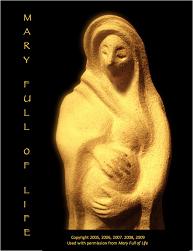Over the last several months, I have learned that if I write a pro-life post that mentions protesting and/or political action as part of the process, someone will write me a comment to insist that we should really just pray and work quietly at the local crisis pregnancy center. Several years ago, after sending around an e-mail detailing the powerful experience of participating in a pro-life counterprotest in DC, I got several positive comments, and one, “Well, you shouldn’t have said anything at all; you should’ve just stood and prayed the rosary.” The implication (even from many pro-lifers) is that the pro-abortion side is right: pro-lifers (or at least those obnoxious enough to protest or get politically active) don’t really care about the women hurt by abortion, they just want to make a point, when they should have restricted their actions to prayer. As you may have noticed, I strongly disagree with this.
The last comment I got, several days ago, concluded that the pro-life movement should abandon politics and protest altogether and just focus on “educating” those women at risk of an abortion.
As I mulled over this, something hit me: protest is a form of education.
No, not in the sense of left-wing professors ordering their students to show up for the head count at some save-the-trees rally and calling it classwork. The protest is not meant for the education of the protestors (although that may also happen), but for those seeing the protest.
Nobody does a protest (ok, almost nobody) just to make noise. The entire point is to get noticed, preferrably by the media, because then more people hear your message, which is the whole point of a protest: to get your message heard. A public protest is, by its very nature, an attempt to educate the public on an issue, or at least on the fact that some people think that the issue is important enough to take a public stand against it.
When people protesting British rule of India set themselves on fire in public squares, they weren’t just making an esoteric statement about their refusal to participate in what they viewed as a totally unacceptable situation. That sort of statement could have been made in private. The statement they were trying to make, I submit, was adressed to the British people living in Great Britain. As one of my history profs once explained, the tactic worked because of the free press and because proper Brits sitting down to breakfast were appalled to open their paper over their tea and scones to find yet another photo of a college student kneeling calmly while burning himself to death in protest in India. Whatever the Brits at home thought of the colonization of India, they were made painfully, shockingly aware that the Indians hated it. The Indians did not think the benefits of being part of the Empire made up for their loss of sovreignty, they did not think it didn’t matter; they hated it enough to die an agonizing death to draw attention to the problem.
The Indians had thought and said this for a long time. It was only their public protest that finally hammered the idea home to the majority of British voters and members of Parliament.
It is ignorant to argue that pro-lifers don’t care about stopping individual abortions or are just out for political power. The pro-lifers are the ones praying and fasting for the end of abortion, operating the crisis pregnancy centers, staffing the post-abortion healing hotlines and retreats, begging money and donations for needy mothers, working at adoption agencies, and standing in all weather outside of abortion mills across the country trying to catch the ear and the attention of the women heading inside to authorize the murder of their babies.
Except for EWTN and other religious networks, these activities don’t make the news. Heck, most diocesan newspapers would rather skip a ho-hum piece on the day-to-day operations of crisis pregnancy centers or (worse) sidewalk counselors at the local abortion clinic to instead highlight yet another self-agrandizing anti-nuke protest by the bishop outside the local military base (our previous bishop’s favorite activity, it seems, from what the diocesan paper reported. If he really wanted to educate someone with power over the issue, he’d have travelled an hour the other direction and held the protest in front of the Pentagon, the U.S. Capitol, or the White House.).
Frankly, good news doesn’t sell papers or TV news programs. If you’re lucky, and it’s a slow news day, one of the more feel-good pro-life programs (like a program to help poor mothers, which can be spun to be more about poverty than pro-life work) might make the human interest spot at the end of the local nightly news. But don’t expect any mainstream TV station to ever voluntarily broadcast the slightest hint that abortion has consequences, so a post-abortion healing retreat article is right out.
What does make the news, at least sometimes, is protests.
After complete ignorance of the existence of the other pro-life activities, some people will see pro-life protests on the news and ask, “What? We’re still arguing about that? Why are they so upset?” And maybe they’ll listen for a minute and some of the horrific facts of abortion (and the immense pro-life work happening silently, invisibly in this country) will get through the “not my problem” shield and start to change someone’s mind.
We have been praying for thirty five years in this country for God to end abortion. We cry out in despair and ask, “Why haven’t You done something?!?”
He did do something. He sent us. As St. Paul says, there are many gifts, but one Spirit who animates all of them. All of us can pray and fast. Most of us can make financial contributions. Some of us will work in crisis pregnancy centers. Some of us will work the phones and walk door-to-door to get pro-life politicians elected. Some of us will step forward as foster parents and adoptive parents. Some of us will publicly stand in protest.
Prayer is the expected minimum. We are all called to do at least that.
But prayer is supposed to propel us to action.
I’ll give St. Augustine the last words. One quote I went looking for, to check who it should be attributed to. The second was in the list and seemed particularly applicable.
“Pray as if everything depended on God, then work as if everything depended on you.”
“Hope has two beautiful daughters. Their names are anger and courage; anger at the way things are and the courage to see that they do not remain the way they are.”








